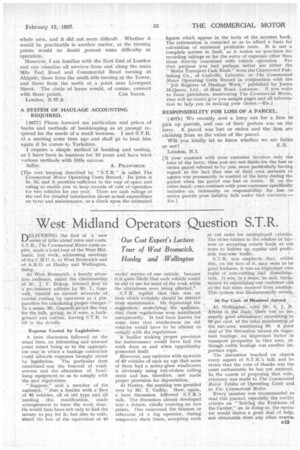West Midland Operators uestion S.T.R.
Page 119

If you've noticed an error in this article please click here to report it so we can fix it.
Our Cost Expert's Lecture Tour of West Bromwich, Hanley and .Wellington
DELIYERING the first of a new series of talks about rates and costs, S.T.R., The Commercial Motor costs expert, made a brief tour of the West Midlands, last week, addressing .meetings of the C.M.I.T.A. at West Bromwich and of A.R.0: at Hanley and Wellington, Salop.
At West Bromwich, a keenly atten.
tive audience, under .the chairmanship of Mr. J. F. Bishop, listened .firse to
pre:iminary address by Mr. L. Cupwell, himself an earnest advocate. of,, careful costing by operators as a preparation for Calculating proper Charges. In a sense; Mr. Gupwell.paved the Way for the talk, giving, as it were, a background and outline, leaving SIT.R, to Jill in the details.
. Expense Caused by Legislation. • .
A keen discussion followed on the usual lines, an interesting and unusual point raised being as to the appropriate way in which a haulage contractor could allocate expenses brought about by legislation. The particular item mentioned was the 'renewal of windscreens and the alteration of head-: lamp equipment so as to comply with the new regulations.
"Suppose;" saida member of the audience, "that a haulier with a' fleet of 40 vehicles, all of old type and all needing this modification, made arrangements to have the work . done.' He would then have not only to find the money to pay for it, but also to withstand tlie loss of the equivalent of 40 weeks' service of one vehicle because it is quite likely that each vehicle would be Out bf use for most of the week while the alterations were bbing effected." S.T.R: replied, that this was: an item Which certainly should be debited from maintenance. He deprecated the suggestion, underlying' the qu4tion, that these regiilations were intinclueed unexpectedly. It had been known for some, time that ,windscreens on old vehicles Would have to be altered to complY with the regulations.
A haulier making 'proper provision for maintenance would have had the work done as and when Opportunity presented itself. Moreover, any operator with upwards of 40 vehicles of such an age that none of them had a safety-glass windscreen is obviously using out-of-date rolling stock and has, therefore, not made proper provision for depreciation.
At Hanley, the meeting was presided over by Mr. T. Caddy. Here, again, a keen discussion followed S.T.R.'s talk. The discussion almost developed into a debate, chiefly centring on two points. . One concerned the fairness or otherwise of a big operator, during temporary slack times, accepting work at cut rates for unemployed vehicles. The Other related to the wisdom or fairness of accepting return loads at cut rates to bolster up regular and profitable bne-way traffic.
S.T.R. was emphatic that, whilst this, on the face of it, may seem to be good business, it was an important root cause of rate cutting and dissatisfaction. It was in a senSe, he said tantamount to sulisidiying,one customer out of.the fair rites received from another. This System was fundamentally wrong.
• 50 Per Cent. of Member Attend.
. At Wellington,. with Mr. S. J. J. ' Atkins in the chair, -thei-e was an unusually good attendance; amounting to 50 per cent. of the total membership of the sub-area, numbering 80. A good deal of the discussion turned on sugar beet haulage, an important factor in transport prosperity in that area, although .cattle haulage was another important topic. 'The "discussion touched on almost every aspect of S.T.R.'s talk and he states that the vote of thanks was the most enthusiastic he has yet received. In the ceurse of proposing that vote, reference was made to The Commercial Motor Tables of Operating Costs and to The Commercial Motor.
Every member was recommended to read this journal, especially the weekly articles on "Solving the Problems of the Carrier," as, in doing so, the operator would derive a good deal of help, not obtainable from any other source.




























































































































































